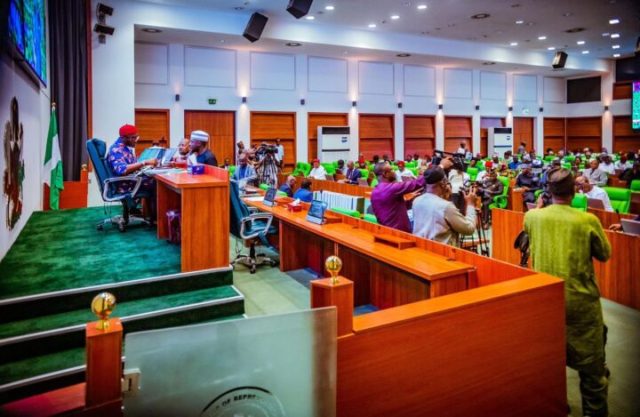Meanwhile, the Bill when assented to shall compel the National Assembly to consider and approve the MTEF on or before the last day of August in each financial year.

The move to combat corruption, block revenue leakages and eliminate wastages of public resources by Ministries Departments and Agencies (MDAs) of government has just begun as the National Assembly has taken the initiative by introducing a Bill to amend the much anticipated Fiscal Responsibility Act (FRA), 2007.
The proposed piece of legislation is titled “A Bill For An Act To Repeal The Fiscal Responsibility Act, No.31 Of 2007 And To Enact The Fiscal Responsibility Act, 2024 To Provide For Prudent Management Of The Nation’s Resources; Ensure Long Term Macro-Economic Stability Of The National Economy; Secure Greater Accountability And Transparency In Fiscal Operations within The Medium Term Fiscal Policy Framework; And The Establishment Of The Fiscal Responsibility Commission To Ensure The Promotion And Enforcement Of The Nation’s Economic Objective; And For Related Matters “
The Bill is sponsored by the Deputy Speaker of the House of Representatives, Rep. Benjamin Kalu, and the other co-sponsors are the Majority Leader, Julius Ihonvbere, Mansur Manu Soro, Lawan Ali Shetima, Ikeagwuonu Ugochinyere, Joshua Audu Gana and Akiolu M. Kayode.
The Bill, which is in different segments, is geared towards ensuring transparency, accountability and prudent management and utilisation of resources for the greater benefit and development of all Nigerians.
OrderPaper Advocacy Initiative has been at the forefront of the amendment of the Fiscal Responsibility Act 2007 to strengthen fiscal policies and address concerns related to accountability, prudent management of funds and Nigeria’s growing debt burden.
Some of the details, as contained in the proposed legislation, suggests that the Executive arm of government is likely to present the Medium-Term Expenditure Framework (MTEF) to the National Assembly for consideration by the end of July.
Meanwhile, the Bill when assented to shall compel the National Assembly to consider and approve the MTEF on or before the last day of August in each financial year,
“The Minister (Finance) shall before the end of the second quarter of each financial year, present the Medium-Term Expenditure Framework to the Federal Executive Council for consideration and endorsement.
“(2) The Federal Executive Council shall, not later than the second week of July in each financial year consider and endorse the Medium-Term Expenditure Framework for the next three years.
“(3) The Medium-Term Expenditure Framework as endorsed by the Federal Executive Council shall, not later than the last week of July in each financial year, be presented by the Minister of Finance to the National Assembly for consideration and approval.
“(4) The National Assembly shall, before the last day of August in each financial year, consider and approve the Medium-Term Expenditure Framework: Provided that where the National Assembly fails to consider, approve the Medium-Term Expenditure Framework one week after the deadline set by this subsection, its approval shall be dispensed with, and the framework shall take effect as presented to the National Assembly.
“(5) The Minister shall, within 48 hours, submit a copy of the MediumTerm Expenditure Framework approved by the Federal Executive Council to the Commission.”
The lawmakers also proposed a 30-day maximum for the MTEF to be gazetted or published on the website of the Ministry of Finance and Budget Office of the Federation within 48 hours of its approval.
According to section 15 (1) “Not later than 30 days of its approval by the National Assembly or otherwise coming into effect, the Medium-Term Expenditure Framework as approved shall be published in the Gazette.
(2) The Medium-Term Expenditure Framework as approved by the National Assembly shall be published on the website of the Ministry of Finance and Budget Office of the Federation within 48 hours of its approval.”
Section 16 (1): “Subject to subsection (2) of this section, the President may cause adjustments to be made to a Medium-Term Expenditure Framework.
“(2) Any adjustment to the approved Medium-Term Expenditure Framework shall be limited to- (a) the correction of manifest error; and (b) changes in the fiscal indicators, which in the opinion of the President are significant.
“17 States and Local Governments which so desire shall be assisted by the Federal Government to manage their fiscal affairs within the medium-term Framework.”
Section 2 (1) of the proposed law stipulates that the Commission shall monitor, enforce and ensure remittances are done as of when due and correctly.
“2 (1) For the purpose of performing its functions under the Act, the Commission shall have power to- a) compel any person or government institution to disclose information relating to public revenues and expenditures; (b) conduct investigations to ascertain whether any person has violated any provisions of this Act; (c) request for and obtain information relating to public revenue, expenditure and related matters from any person, department, public institution or body, agency, or arm of the Federal Government;
(d) request and be granted access by all government ministries, departments, extra-ministerial departments, agencies, public bodies, institutions, corporations and arms of government to inspect all documents, records, minutes, entries, electronic systems, machines and objects that the Commission shall deem necessary for the performance of its functions under this Act.”



